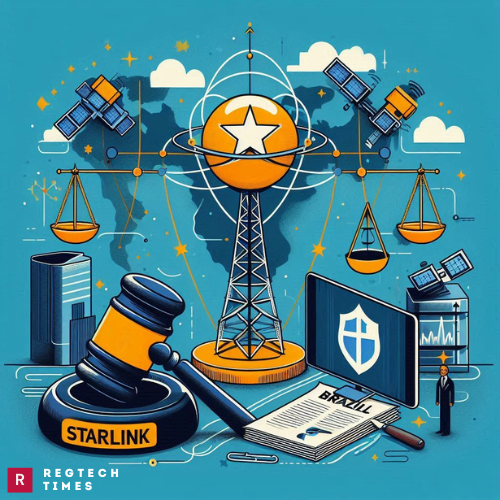A legal and political showdown is unfolding between Elon Musk’s companies—Starlink and X (formerly Twitter)—and the Brazilian government. This conflict began with Brazil’s Supreme Court decision to ban X over its role in spreading disinformation, but it has now expanded into a broader dispute involving telecommunications regulations and potential sanctions against Musk’s satellite broadband company, Starlink.
Brazil’s Supreme Court Takes Action Against X
The controversy started when Brazil’s Supreme Court, led by Judge Alexandre de Moraes, ordered a nationwide ban on X, accusing the social media platform of allowing the spread of hate speech and disinformation, particularly targeting Brazil’s electronic voting system. The court argued that such content posed a serious threat to the country’s democracy and unanimously upheld the decision to block X for its failure to appoint a local legal representative, as required by Brazilian law.
Following this decision, X was removed from access for most Brazilian users, although some continued to access it via virtual private networks (VPNs). The court has warned of daily fines of 50,000 reais (about £9,000) for anyone caught bypassing the ban, although how this penalty will be enforced is still uncertain.
Anatel’s Threat to Starlink
In response to the court’s decision, Brazil’s telecommunications regulator, Anatel, is now focusing on Starlink. Anatel is scrutinizing all telecom operators in Brazil to ensure compliance with the court’s order to block X. Starlink is the only telecom provider that has openly refused to comply with the directive, declaring that it will not block X from its services until its Brazilian bank accounts, which have been frozen by the court, are unfrozen.
Artur Coimbra, a commissioner at Anatel, confirmed that Starlink has officially communicated its refusal to comply with the court’s order, which puts the company at risk of significant sanctions, including the possible withdrawal of its license to operate in Brazil. Such a sanction would significantly impact Musk’s business operations, as Starlink is crucial for providing satellite internet services to remote and underserved regions of the country.
Political Backing from President Lula da Silva
President Luiz Inácio Lula da Silva has publicly supported the Supreme Court’s decision, asserting that the judiciary’s actions send a strong message worldwide: no individual, regardless of their wealth or influence, is above the law. He condemned Musk’s management of social media platforms, accusing him of using free speech as a pretext to promote far-right ideologies. Lula argued that regulating platforms like X is essential to safeguarding democratic discourse and preventing harmful content from eroding public trust in Brazil’s institutions.
Brazil Blocks X (Formerly Twitter) Amid Legal Feud: A Clash Over Free Speech and Sovereignty
The stakes are particularly high for Musk because Brazil is a significant market for X, with approximately 21.5 million users, making it the platform’s sixth-largest audience globally. The ban and potential regulatory crackdown could have serious economic repercussions for Musk’s businesses, including Starlink, in Brazil.
Elon Musk’s Response and Potential Escalation
Elon Musk has not remained quiet in the face of these actions. In response to the legal threats against Starlink, Musk has hinted at potential retaliation, threatening to seek reciprocal seizure of Brazilian assets if the government does not return what he calls “illegally seized property” of X and SpaceX. Musk tweeted that “unless the illegally seized property of 𝕏 and SpaceX is returned by the Brazilian government, a reciprocal seizure of government assets will be sought.” Hope Lula enjoys flying commercial.”
Musk defended his companies, claiming that X complies with the laws of every country where it operates. However, he asserted that in Brazil, they were being coerced into breaking Brazilian laws by keeping government demands secret. This response reflects Musk’s broader resistance to what he sees as governmental overreach in regulating global tech platforms.
Broader Implications: Free Speech vs. Democratic Safeguards
The dispute between Starlink and the Brazilian government exemplifies the broader global debate on regulating social media. At its core, it raises crucial questions about balancing free speech and protecting democratic institutions from disinformation. While platforms like X advocate for minimal restrictions on content in the name of free expression, governments worldwide increasingly worry about the damaging effects of unchecked online speech on public discourse and democratic processes.
As this confrontation continues, it highlights the complex and often contentious relationship between tech giants and national governments. The outcome could set a precedent for how countries regulate foreign tech companies and assert control over digital spaces within their borders. Meanwhile, Musk’s stance suggests a potential escalation into a more significant diplomatic conflict, with far-reaching implications for internet regulation and the balance of power between tech billionaires and sovereign states.



